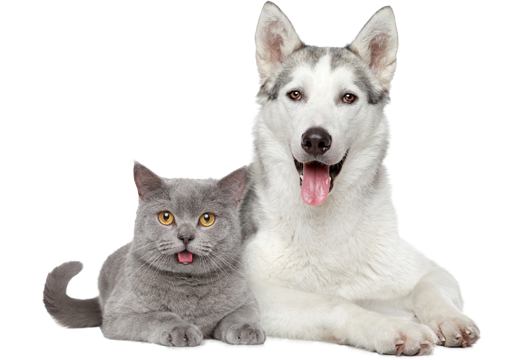Vaccinations

Good protection
Good protection for your pet against deadly diseases is of course very important. We ensure that you always receive a call for the annual vaccination on time.
We also provide all the necessary vaccinations and/or (blood) examinations you need to take your pet abroad.
Animals that go abroad have to be equipped with a “Chip” and a European passport; we also arrange this for you.
Vaccination: sense or nonsense?
Most dogs and cats in the Netherlands are vaccinated according to a fixed schedule, whereby after a basic series of vaccinations (At 6, 9 and 12 weeks of age in dogs, and at 9 and 12 weeks in cats) your pet will be annually vaccinated against a number of deadly diseases. Thanks to these consistently maintained vaccinations, diseases such as distemper, parvovirus and hepatitis in dogs, and cat disease and cat flu in cats are almost completely eradicated. Now there are still quite a few owners who never vaccinate their animals, their motivation: “He is never sick, so why should I vaccinate my pet?”
Such animals are often lucky for years because most people in their environment do vaccinate their animals, thus giving deadly viruses no chance. The trouble only starts if these unvaccinated animals do become infected with one of more of these viruses.
A well-executed series of basic vaccinations, followed by annual revaccination leads to a virtually waterproof protection against distemper, parvovirus, hepatitis and Weil’s disease (leptospirosis) in dogs and cat flu and cat disease in cats. In some areas, it may be useful to vaccinate dogs once more in the spring against Weil’s disease, because it appears that in spring and summer the infection is greatest, and because in particular vaccination against Weil’s disease in many dogs does not offer the full 12 months of protection.
More and more sick puppies!
In the last years we have seen a new phenomenon: the massive free import of puppies from Eastern Europe. Through all kinds of ways these animals arrive in large quantities through traders, often equipped with unclear vaccination booklets, signed by fictitious veterinarians. Assume that nothing has been vaccinated here. It is only about making money. The consequences are obvious: last year we again saw puppies with canine distemper in our treatment room, something that had not happened for years!
Kennel cough
It is another story when it comes to kennel cough (cough). Regularly kennel cough is seen in animals correctly vaccinated on schedule; either with the nasal spray method or the injection method. Vaccination against kennel cough is a vaccination against Bordetella bronchiseptica and parainfluenza. Animals which are vaccinated will generally receive no laryngitis caused by these pathogens. However: throat inflammation can be caused by many more germs, especially if an animal barks and pants a lot. This causes the mucous membranes in the throat and larynx to dry out and become sensitive. The symptoms of laryngitis, irrespective of the cause, are as a rule the same: a hard dry cough, followed by retching, optionally combined with poor appetite.
So why is vaccination against kennel cough so insisted upon? Because the Bordetella infection is highly contagious, and can be very quickly spread, especially in groups of dogs (guest house/kennel dog club, show, etc.). In addition, often a Bordetella infection worsens at a greater rate than a throat infection with another pathogen.
Rabiës
This (also deadly for humans) virus does not exist in our country. Very occasionally an infected bat is found, but the last case found in larger animal-dates back to the middle of the eighties. It doesn’t mean that nothing is going on: every year in the nearby countries, thousands of infected animals are found and put down. Hence these countries are very attentive to the vaccination of dogs and cats. So, vaccinate your pet against rabies if you go abroad, even if your dog just occasionally enters Belgium. Moreover, it is also required in other countries, like the pet passport and the chip!
Lyme disease
For some time there has been a reliable vaccine against Lyme disease (borreliosis) available for dogs. Everyone has heard of this disease. It also occurs in humans, often with very nasty and far-reaching consequences for the patient. This disease cannot be transferred to human animal (and vice versa).
In dogs which are infected with the Lyme disease bacterium (Borrelia) we see problems such as lameness, fever and lethargy.
In severe cases, an inflammation of the kidneys, the heart muscle or the nervous system may occur. Lyme disease is therefore caused by a bacterium, which is transmitted by the bite of a tick. The vaccine ensures that the bacteria are made harmless immediately after infection. Even still, a good protection against ticks is necessary due to the fact that ticks also transmit other diseases.
In order to build up good protection, the dog needs two vaccinations with an interval of three weeks. In order to keep the animal well protected, it must be re-vaccinated once a year. Unfortunately, the vaccination cannot be given together with other annual vaccinations. The best time to vaccinate is the spring, before the height of tick season. This also insures that you do not vaccinate a dog who is already infected with Lyme disease.
